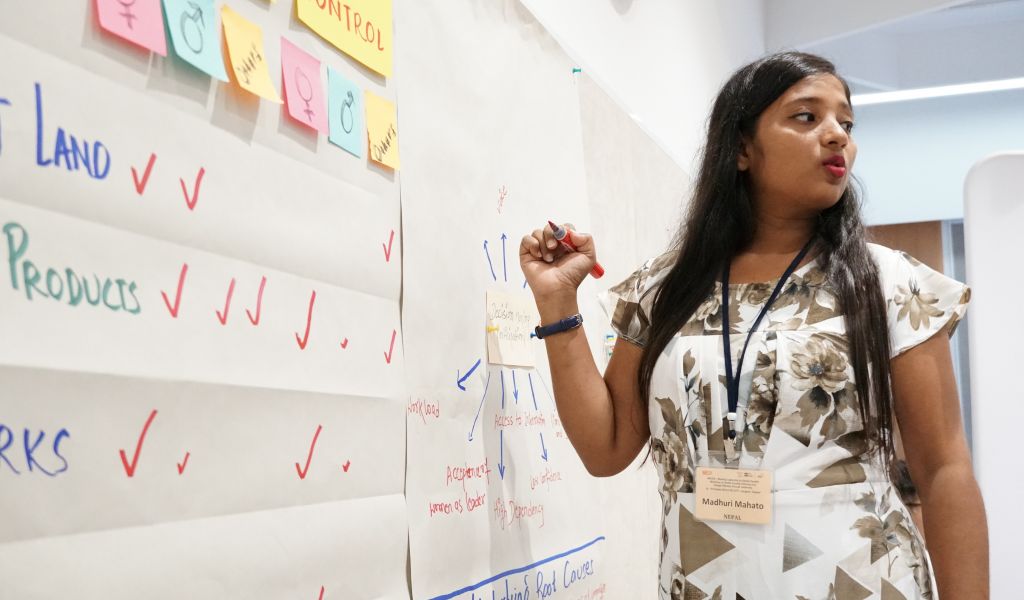Asian leaders tackle gender inequalities in forestry

Thirty women and men from across the Asia-Pacific region met in Bangkok 16 to 18 October 2019 to further develop their plans for achieving gender equality in forestry. They aim to make forestry inclusive by working within institutions to ensure equal rights and benefits in forest communities.
“I want my coworkers and other people in Myanmar to understand that gender and forestry are not separate issues but must be viewed together,” said Khin Mon, program officer at the Myanmar Environment Rehabilitation-Conservation Network (MERN). “But bringing up gender issues has been challenging as there is no gender policy in place in my organization or gender and forestry policy in the government.”
Launched by RECOFTC in March 2019, the three-year WAVES program is designed to strengthen the leadership skills of participants by enhancing their expertise in gender issues and ways to overcome gender inequality.
“We want WAVES to have an impact beyond these gender leaders, for them to influence their countries,” said Kalpana Giri, senior program officer of WAVES at RECOFTC. “Each action plan creates opportunities for learning across countries and for people to see that change is possible. By providing more examples of equality in forests, WAVES will reframe women as equal actors in forestry landscapes.”
The gender leaders come from different sectors involved in forestry such as government ministries, civil society organizations, academia, the media and local communities. Still, their individual action plans are different and tailored to their unique contexts.
In Indonesia, Ibu Novaty Eny Dungga leads efforts to include gender courses in her curriculum at the University of Hasanuddin. She wants to ensure that her students learn about gender and social issues in agronomy, the science and technology of producing plants in agriculture. Her work paves the way for students to conduct gender-inclusive research that will help farmers improve their agricultural productivity and livelihoods.
“I want to strengthen women’s groups like mine at the university so that we support each other,” said Dungga. “I want women to have an equal chance at leadership and make forestry more inclusive.”
Another WAVES leader is Madhuri Mahato, a journalist from Nepal who works at BBC Nepali Sewa and Radio Narayani. She is committed to publishing articles, stories, news and documentaries that inform the public about the importance of gender.
“After returning to my country, I want to create a network connecting media workers and share my knowledge regarding gender,” she said. “The dream of the WAVES is also our dream.”
The leaders’ work comes at a time when climate change is exacerbating social and economic disparities, especially for women and marginalized communities. But, studies show that the equitable management of the world’s natural resources helps to combat these disparities and supports the achievement of the global Sustainable Development Goals.
At the event, leaders considered the need to influence norms surrounding the role of women and other marginalized communities in forestry to make lasting change. Chhun Hak, Director General of the Ministry of Women’s Affairs in Cambodia, works directly on this issue by promoting the benefits of equality throughout Cambodia’s ministries.
“Much of gender equality work is about changing the mindsets of people so that they can recognize that equality will benefit all, not just women,” said Hak.
He says that gender terminology, such as intersectionality, is not well-known in Cambodia and this absence in the language makes it difficult to discuss gender issues in local contexts. Hak and his team are working to ensure that gender concepts and terms are understood and applied by the Ministry of Environment and other ministries. They are also setting up mentorship and training programs to promote gender equity.
For others, like Khin Mon, who works in Myanmar, the WAVES program motivates her to fight for equality with the hope of inspiring larger, national change.
“I hope to implement the first gender policy for my organization which will set an example for other organizations and ministries to also prioritize gender,” said Mon. “Being a part of WAVES has encouraged me and inspired me to pursue this change.”

